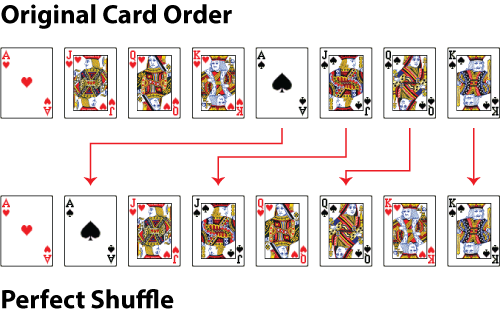
There are 52 cards in a standard French-suited deck. Each card consists of a rank (of which there are 13 in total) and a suit (of which there are 4 in total), as shown below.

An important aspect of most (if not all) of these games is randomization, or shuffling to increase the state space of the game and/or ensure that players don't know everything about other players' positions in the game. A good shuffle has two important properties: 1) the starting state has no bearing on the result of the shuffle, and 2) the shuffle produces all possible sequences of cards with equal probability. Consider a "perfect" shuffle, where a deck is split into two half-decks of equal size and cards are interleaved in a perfectly alternating fashion. An example is illustrated below with a toy deck consisting of eight cards.

As one might expect, shuffling in this way isn't particularly good. The starting state does indeed influence the resulting state, and, for a 52 card deck, only a small number of possible sequences can result, even if the perfect shuffle is applied iteratively.
Now let's consider a popular shuffling technique, the "riffle." It's essentially a perfect shuffle, but, because it's performed by a human being, random imperfections in the shuffler's technique translate to randomness in the ordering of cards. This randomness is welcome given our two-fold goal, and, as it turns out, we can get a pretty good shuffle by applying the riffle technique six or seven times (depending on whom you ask).

But we can do better, significantly better. Enter the Fisher-Yates shuffle, an algorithm that can satisfy both of our
goals in a single pass of the cards. As applied to our particular use case, it mandates that, for each card in the deck,
we perform a swap with some randomly selected card that has not yet been swapped. Or, as a computer scientist might
prefer to say, we iterate over each card c, and for c at index i we swap c with a randomly selected card whose
index is between i and 51, inclusive.
Of course, we can claim that the shuffle is truly random if and only if we are able to select swap cards, well, randomly. Unfortunately for us, computers largely rely on pseudorandom number generators, or algorithms that generate sequences of numbers whose properties approximate the properties of sequences of random numbers. They are deterministic, and, in many cases, incapable of generating all possible sequences of cards (of which there are 52!, which is quite a large number). More on this problem later.
Write a program called Deck that initializes a deck of playing
cards, performs either some number of perfect shuffles or a Fisher-Yates
shuffle, and prints each card of the deck to stdout. Each Card is a
typedefed struct consisting of a rank and a suit. Output should be
formatted as a sequence of ranks and suits delimited by singular spaces (e.g.
AS KS TD ...). The mode under which the program operates is given by the flags
-p or -fy for "perfect" and "Fisher-Yates," respectively. If both modes are
specified, the program should print an error message to stdout and exit.
Under mode -p a single
integer is given to specify the number of perfect shuffles performed. If a negative value is specified, an error is printed and the program exits. Under mode -fy a
filename is provided, the contents of said file being integers (presumably selected randomly)
representing swap indices for the shuffle. Consider the following example of a Fisher-Yates
shuffle with an 4-card toy deck:
Deck: AC 2C 3C 4C
Swap indices: 2 2 1
Result after applying the first swap: 3C 2C AC 4C
Result after applying the second swap: 3C 4C AC 2C
Result after applying the final swap: 3C 4C 2C AC
As mentioned above, sometimes PRNGs aren't all that good, but a user may wish to nonetheless use one of these subpar PRNGs
in Deck. Let's assume that the major deficiency of a given user's PRNG is that it cannot generate
every sequence of cards with one simple pass. Similarly to how applying the riffle technique to a deck multiple times
gives us a better shuffle, we can apply the Fisher-Yates shuffle with swap indices generated by the deficient PRNG to an arbitrary number of cards
over an arbitrary number of iterations to give us a better shuffle.*
You can find template deck.h, deck.c, and deck_driver.c files with some basic functionality in /c/cs223/hw4/Optional/.
Ultimately, your goal is to modify the provided code so as to be compatible with the function declarations given in
/c/cs223/hw4/Required/deck.h.
To begin, notice that the function signatures given in /c/cs223/hw4/Required/deck.h differ
drastically from those in the template files. More specifically, you'll
find that only pointers to Decks are specified as return types. This convention is adopted
because it enables the use of opaque structs. Under this paradigm, we can place the actual definition for
the struct deck in deck.c and give a generic forward declaration in
deck.h: typedef struct deck Deck;. Doing so encapsulates the struct away from outside
programs, forcing them to interact with the functions defined for our Deck instead of directly
manipulating its members. This behavior is desirable, as now we can modify the implementation for our abstract
data type as we please without having to worry about breaking programs that rely on the details of its
implementation. Getting back to the change in function signature, returns of type Deck * must be made
instead of type Deck because our vague forward declaration doesn't tell the compiler anything about
how big the struct actually is, and the compiler needs to allocate space for that return value. Because Deck * is
a pointer, the compiler knows exactly how much space to allocate––it's the same as for all other pointers.
Also note that a Deck is defined as a statically allocated array of NCARDS cards. While, for this exercise,
we won't need to grow the deck to some arbitrary size, we would nonetheless
like to allocate cards on the heap to allow for games
with larger decks like n-deck blackjack. For this reason,
you'll want to change the mode of allocation for this array-based list from static to dynamic. In doing so, you'll need to change the implementation of
deck_create to allocate space for the newly created deck and iteratively copy new cards into that space. In populating your new
deck with cards, I'd recommend iterating over characters given in RANKS and SUITS.
You'll also have to write a deck_destroy function to free
the space allocated for the deck.
Additionally, consider that in deck_driver.c, the array swap_indices is statically allocated. Because our protocol
is PRNG-agnostic, we'd like to leave it up to the user to indicate however many swap indices he or she feels
will be necessary to make a Fisher-Yates shuffle truly random. So, it might be a good idea to dynamically
allocate swap_indices and grow it as necessary, depending on the number of swap indices provided.
Finally, implement deck_fisher_yates_shuffle and deck_perfect_shuffle. Note that if the user provides
a swap index that is out-of-bounds, Deck should interpret said index as either a 0 or 51 - i, where i
gives the current index of the shuffle. Note that when reaching the
52nd, 104th, etc. swap index, the process restarts with card 0.
You should create a makefile with the executable Deck
as the default target.
deck.h), your log,
and your makefile as submission number 4
(replace the filenames below with your filenames).
[crb84@hawk hw4]$ /c/cs223/bin/submit 4 deck.c deck_driver.c makefile log
Copying deck.c
Copying deck_driver.c
Copying makefile
Copying log
[crb84@hawk hw4]$ /c/cs223/bin/testit 4 Deck
/home/classes/cs223/Hwk4/test.Deck
Copying deck.hExecuting /home/classes/cs223/Hwk4/test.Deck
Public test script for Deck (09/24/2020)
***** Checking for warning messages *****
Making -B ./Deck
gcc -g3 -Wall -std=c99 -pedantic -c -o deck.o deck.c
gcc -g3 -Wall -std=c99 -pedantic -c -o deck_driver.o deck_driver.c
gcc -g3 -Wall -std=c99 -pedantic -o Deck deck.o deck_driver.o
Each test is either passed or failed; there is no partial credit.
To execute the test labelled IJ, type one of the following commands
depending on whether the file /c/cs223/hw4/Tests/tIJ is executable or not
/c/cs223/hw4/Tests/tIJ
./Deck < /c/cs223/hw4/Tests/tIJ
The answer expected is in /c/cs223/hw4/Tests/tIJ.out.
Perfect Shuffling
PASSED 001. One shuffle
PASSED 002. Two shuffles
PASSED 003. Four shuffles
PASSED 004. 100 shuffles
Perfect Shuffling: 4 points
Fisher-Yates
PASSED 005. Swapping a few cards
PASSED 006. Swapping the first with the fifth
PASSED 007. Swapping the first with the last
PASSED 008. Performing more than 52 swaps
PASSED 009. Swapping nothing
PASSED 010. Running a few swaps under valgrind
Fisher-Yates: 6 points
Deductions for Violating Specification (0 => no violation)
End of Public Script
10 points Total for Deck
Possible Deductions (assessed later as appropriate)
-10 Deficient style (comments, identifiers, formatting, ...)
-5 Does not make
-5 Makefile missing
-5 Makefile incorrect
-1 Log file incorrectly named
-1 Log file lacks estimated time
-1 Log file lacks total time
-1 Log file lacks statement of major difficulties
***** Checking log file *****
Estimate: 2:00 ESTIMATE
Total: 2:00 TOTAL
*It should be noted, however, that the exact mechanisms by which shuffling is improved are very different.